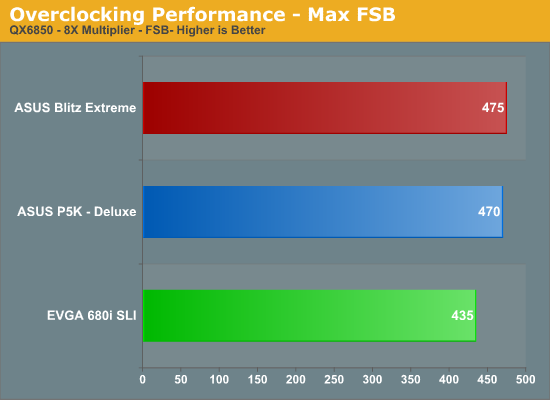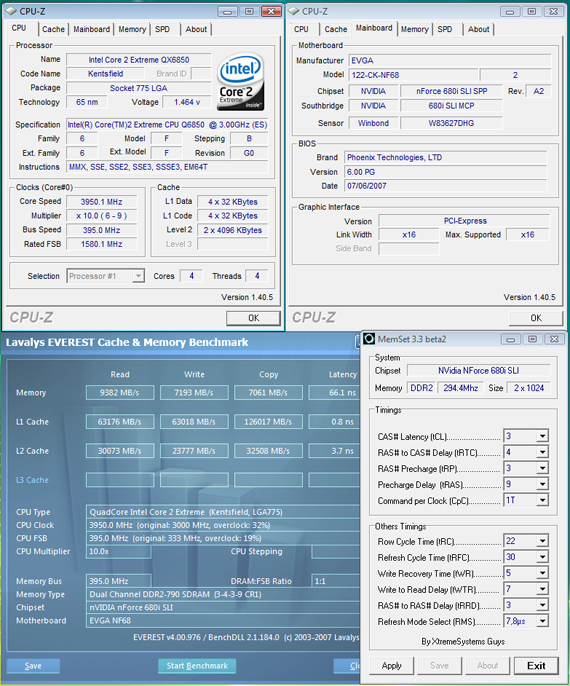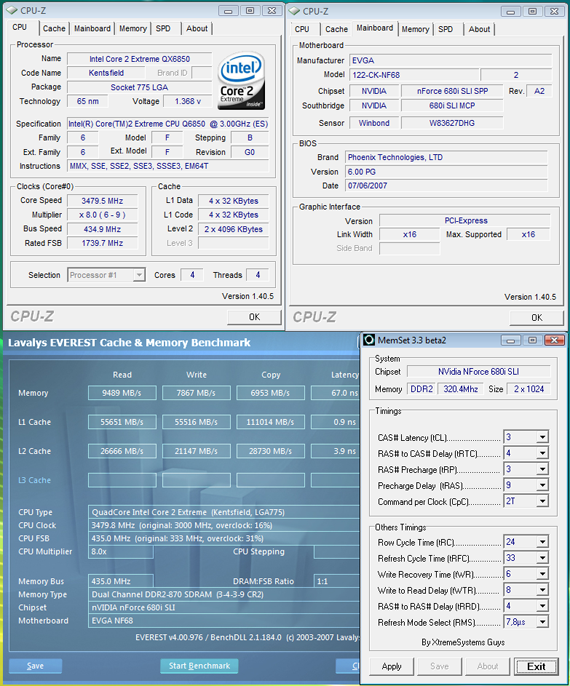NVIDIA 680i SLI: Official 1333MHz FSB CPU Support Arrives
by Gary Key on July 20, 2007 12:01 AM EST- Posted in
- CPUs
QX6850 Quad Core Overclocking:
We need to state up front that our QX6850 sample is not the best of the lot when it comes to overclocking. In fact, it seems downright disappointing to us as it does not matter what voltages or board we utilize: this processor refuses to POST once you dial in 4GHz.
We are utilizing the recently released P30 BIOS that features additional tuning for 1333MHz FSB processors. We did notice some improvements over the P29 Beta but to be honest, the majority of improvements are with the 1066FSB based processors. These improvements range from slightly higher overclocks with lower voltage requirements to improved compatibility with our RAID cards.
Our first test is designed to maximize our CPU speed while also overclocking the FSB as much as possible. We ended up with a final 10x395 setting with our memory operating in Sync mode at DDR2-790 with timings at 3-4-3-9 1T. We noticed with this CPU and board combination that throughout testing we had a choice of either running tight timings near DDR2-800 or having to really loosen up the timings at DDR2-1066 or above in order to maintain stability.
Our OCZ PC2-9200 will normally do 4-4-4-12 timings up to DDR2-1100 but we had to run 5-5-5-15 or higher above 1000 with this CPU. We determined our best memory throughput and latencies were around DDR2-800 so we remained in this range throughout testing. We also tried additional memory modules from Corsair, G.Skill, and SuperTalent with the same results. It appears to us that some fine tuning is still required with the P30 BIOS at this time.
We dropped the multiplier on our QX6850 to eight and were rewarded with a final 8x435FSB setting compared to a 8x475FSB on the ASUS Blitz Extreme board. This board did make it to 8x470FSB with greatly increased voltages, but it was not stable over the time it takes to run our benchmark test suite. The main culprit is heat and even with additional air cooling, the system is just not stable on a 24/7 basis.
We should also note that we experienced one of the infamous 680i "holes" with our component combination that started around 440FSB and stayed until the 465FSB range. That left us with a choice of 435FSB or 470FSB; we really tried to make the 470FSB work on a consistent basis but we just could not get the system stable enough to sign off on it for daily usage. Once again, we had a degree of difficulty running our memory in the DDR2-1066 to 1170 range without resorting to very loose timings with 5-7-7-24 required at DDR2-1170 for stability. This did not occur with our E6850 CPU so the problem seems to be the quad core setup.

While our current EVGA 680i SLI sample tops out around 40FSB lower than our two ASUS P35 boards, we still consider 435FSB with the 680i chipset to be very good. We have a fairly strong opinion about the current FSB race and the detriments it brings to overall system performance and stability, but we'll save it for the roundup.
| EVGA 680i SLI Overclocking Testbed |
|
| Processor | Intel Core 2 Extreme QX6850 Quad Core, 3.00GHz, 8MB Unified Cache 1333FSB, 9x Multiplier |
| CPU Voltage | 1.4625V (default 1.2750V) |
| Cooling | Tuniq 120 Air Cooling |
| Power Supply | OCZ ProXStream 1000W |
| Memory | OCZ Reaper PC2-9200 (2x1GB) 3-4-3-9 |
| Video Cards | 1 x MSI 8800GTX |
| Hard Drive | Western Digital 150GB 10,000RPM SATA 16MB Buffer |
| Case | Cooler Master CM Stacker 830 |
| Maximum CPU OC | 395x10 (3-4-3-9 1T, 790MHz, 2.15V), CPU 1.4625V 3950MHz (+32% CPU) |
| Maximum FSB OC | 435x8 (3-4-3-9, 870MHz, 2.15V), CPU 1.3625V 3480MHz (+31% FSB) |
| . | |
We need to state up front that our QX6850 sample is not the best of the lot when it comes to overclocking. In fact, it seems downright disappointing to us as it does not matter what voltages or board we utilize: this processor refuses to POST once you dial in 4GHz.
 |
| Click to enlarge |
We are utilizing the recently released P30 BIOS that features additional tuning for 1333MHz FSB processors. We did notice some improvements over the P29 Beta but to be honest, the majority of improvements are with the 1066FSB based processors. These improvements range from slightly higher overclocks with lower voltage requirements to improved compatibility with our RAID cards.
Our first test is designed to maximize our CPU speed while also overclocking the FSB as much as possible. We ended up with a final 10x395 setting with our memory operating in Sync mode at DDR2-790 with timings at 3-4-3-9 1T. We noticed with this CPU and board combination that throughout testing we had a choice of either running tight timings near DDR2-800 or having to really loosen up the timings at DDR2-1066 or above in order to maintain stability.
Our OCZ PC2-9200 will normally do 4-4-4-12 timings up to DDR2-1100 but we had to run 5-5-5-15 or higher above 1000 with this CPU. We determined our best memory throughput and latencies were around DDR2-800 so we remained in this range throughout testing. We also tried additional memory modules from Corsair, G.Skill, and SuperTalent with the same results. It appears to us that some fine tuning is still required with the P30 BIOS at this time.
 |
| Click to enlarge |
We dropped the multiplier on our QX6850 to eight and were rewarded with a final 8x435FSB setting compared to a 8x475FSB on the ASUS Blitz Extreme board. This board did make it to 8x470FSB with greatly increased voltages, but it was not stable over the time it takes to run our benchmark test suite. The main culprit is heat and even with additional air cooling, the system is just not stable on a 24/7 basis.
We should also note that we experienced one of the infamous 680i "holes" with our component combination that started around 440FSB and stayed until the 465FSB range. That left us with a choice of 435FSB or 470FSB; we really tried to make the 470FSB work on a consistent basis but we just could not get the system stable enough to sign off on it for daily usage. Once again, we had a degree of difficulty running our memory in the DDR2-1066 to 1170 range without resorting to very loose timings with 5-7-7-24 required at DDR2-1170 for stability. This did not occur with our E6850 CPU so the problem seems to be the quad core setup.

While our current EVGA 680i SLI sample tops out around 40FSB lower than our two ASUS P35 boards, we still consider 435FSB with the 680i chipset to be very good. We have a fairly strong opinion about the current FSB race and the detriments it brings to overall system performance and stability, but we'll save it for the roundup.










18 Comments
View All Comments
FireTech - Saturday, July 21, 2007 - link
Seconded.
Actually, it's over four months now. First post in http://forums.anandtech.com/messageview.aspx?catid...">mATX Roundup was on 15/03/07....
No matter, we do have another Intel focussed article to read while we wait for it ;)
DigitalFreak - Friday, July 20, 2007 - link
Good job! Want a cookie?
JKing76 - Friday, July 20, 2007 - link
No thanks, the thrice-promised uATX roundup would be fine.CrystalBay - Friday, July 20, 2007 - link
It must get really boring to keep testing MB's without much more than 2% performance differences.... Parity blows.....poohbear - Friday, July 20, 2007 - link
nice article, but the above was a bit much for a "professional" article. no offense, i like anantech for their technical knowledge not their ability to ramble on w/ half-hearted jokes. do i really need to read all that before understanding all u needed was a P35 board?
Chunga29 - Friday, July 20, 2007 - link
I actually thought the snarky comments at the beginning was the most enjoyable part. All NVIDIA's marketing hype kicking in bragging about their platform, when the reality is that it's nothing really special. The more pressing concern was the next sentence:Okay, so that's just one more reason to stick with XP for me, but seriously are you telling me that NVIDIA's launch Vista drivers were so perfect that no updates are necessary? I'd say their driver teams are probably overworked right now, but regardless if I were looking at Vista that situation wouldn't make me very happy.
BitJunkie - Friday, July 20, 2007 - link
I've had this board and a 7950GX2 card from nvidia since December 2006 with an E6600 plugged in to it. It's been stable at a 1333 FSB with memory running at 1066 since then all be it with slack 5-5-5-15 timings.On the whole it's a fast(ish) and stable system BUT....and it's a BIG but the drivers have been the weak link since I installed Vista in January. Not real change for me in that time, I STILL get BSOD'd regularly, the SLI functionality is borked for the gfx card and up until new BIOS my raid array keept locking up on boot.
Expecting them to deliver the goods for the newer 1333 fsb quad core CPUs is kind of like pissing in to the wind. I so hope amd / ati get their act together soon, this is getting old.
Sunrise089 - Friday, July 20, 2007 - link
Agreed - I can find benchmarks anywhere, and this sort of article (unlike say the memory wall one) doesn't require a lot of technical expertise - so why not liven it up a bit.